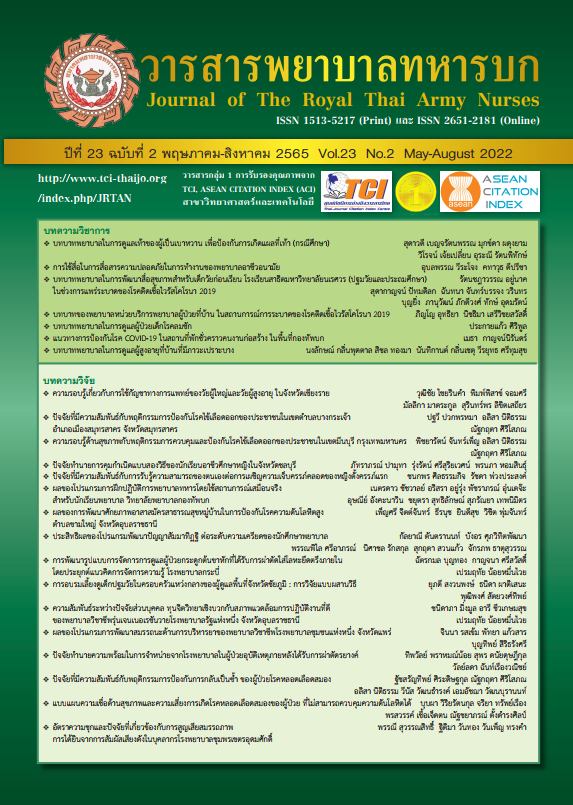Clinical Competency Assessment Model for Nursing Students Based on Miller’s Pyramid Framework Using Entrustable Professional Activities
Keywords:
Clinical Competency Assessment Model, Miller's Pyramid Framework, Entrustable Professional Activities, Scoring rubricsAbstract
The purpose of this research was to develop the quality of a clinical competency assessment model for nursing students based on Miller’ s Learning Framework using entrustable professional activities. The research informants developed a clinical competency assessment model consisted of 37 nursing experts. The samples for the trial of clinical competency assessment model and examining the quality of the developed model were 2 nursing instructors, and 10 fourth-year nursing students. The research instruments consisted of the Entrustable Professional Activity Scale and Clinical Competency Assessment Scale, and the scoring rubrics. The results were summarized as follows:
The development of the clinical competency assessment model consisted of 1) 82 essential entrustable professional activities of nursing students, classified into 25 domains. The activities were divided into 5 levels of supervision from levels 1 to 5 consisting of 4, 25, 12, 20 and 21 activities, respectively, 2) Clinical competency assessment components consisting of 5 core nursing professional competencies with 22 indicators, and 3) The developed clinical competency assessment model and the scoring rubrics; nursing practice was the most important core competency component, followed by core competency in the ethics, code of conduct and law. The clinical competency assessment model consisted of three stages: preparatory, operational, and concluding. The results of this study show that the developed clinical competency assessment model is appropriate, and the clinical competency assessment scale is of satisfactory quality in terms of validity and reliability. Therefore, it is recommended that nursing institutions use it as a tool to assess the clinical competency of nursing students who are graduating to build confidence in the quality of nursing practice upon graduation.
Downloads
References
Kemery S, Morrell BL. Differences in psychomotor skills teaching and evaluation practices in undergraduate nursing programs. Nursing education perspectives. 2020; 41(2): 83-7.
Miller GE. The assessment of clinical skills/ competence/performance. Academic Medicine. 1990;65(9): S63-7.
Cruess RL, Cruess SR, Steinert Y. Amending Miller’s pyramid to include professional identity formation. Academic Medicine. 2016; 91(2):180-5.
Ten Cate O, Carraccio C, Damodaran A, Gofton W, Hamstra SJ, Hart DE, et al. Entrustment decision making: extending Miller’s pyramid. Academic Medicine. 2021; 96(2): 199-204.
Chen HC, van den Broek WE S, ten Cate O. The Case for Use of Entrustable Professional Activities in Undergraduate Medical Education. Academic Medicine. 2015; 90(4): 431-6.
Kiernan LC, Olsen DM. Improving clinical competency using simulation technology. Nursing. 2020; 50(7): 14-9.
Streerut Thadakant, Sumolchat Duangbubpha. Psychomotor Entrustable Professional Activities of Newly Graduated Nurse-Midwives: A Delphi Study. Rama Nurs J. 2020; 26(2), 246-62. (in Thai)
Soiy Anusornteerakul, Saranya Tienprasert, Busara Kanchanabatr. Entrustable Professional Activities on Psychomotor Skill among Newly Graduated Nurses. 2020; 38(1): 69-77. (in Thai)
Sujika Phumkokrux, Achara Sukonthasarn, Anyarat Wongwiriyapun, Thunyabhorn Liewtrakul, Watcharee Nakhapa. Desired Characteristics of Graduates from Faculty of Nursing, Chiang Mai University as Perceived by their Supervisors/ Employers. Nursing Journal. 2016; 43 Suppl: 151-61. (in Thai)
Juntima Rerkluenrit, Tassaneeya Wongsachantanon, Nuntiya Rucksorn and Sukunya Dayvelok. An Assessment on Competencies of Nurse Graduates from the Bachelors of Nursing Science Program, Srinakharinwirot University, Academic Year of 2010. Thai Pharm Health Sci J. 2012; 7(4): 167-74. (in Thai)
Shrivastava SR, Shrivastava PS. Utility of direct observation of procedural skills method in producing a competent medical graduate. Journal of Current Research in Scientific Medicine. 2019; 5(2): 130-1.
Puttiraporn Hungsawanus, Shotiga Pasiphol, Shotiga Pasiphol. Development of Nursing Practice Competency Assessment Model for Nursing Students Practicing in Labor Room by Using an Application of Assessment Center. Journal of Research and Curriculum Development. 2020; 9(2): 138-58. (in Thai)
Rungrudee Klaharn. The development of a competency assessment system for nursing students’ practicum. Journal of The Royal Thai Army Nurses. 2013; 14(2): 48-58. (in Thai)
Downloads
Published
How to Cite
Issue
Section
License
Copyright (c) 2022 Journal of The Royal Thai Army Nurses

This work is licensed under a Creative Commons Attribution-NonCommercial-NoDerivatives 4.0 International License.
บทความหรือข้อคิดเห็นใดใดที่ปรากฏในวารสารพยาบาลทหารบกเป็นวรรณกรรมของผู้เขียน ซึ่งบรรณาธิการหรือสมาคมพยาบาลทหารบก ไม่จำเป็นต้องเห็นด้วย
บทความที่ได้รับการตีพิมพ์เป็นลิขสิทธิ์ของวารสารพยาบาลทหารบก
The ideas and opinions expressed in the Journal of The Royal Thai Army Nurses are those of the authors and not necessarily those
of the editor or Royal Thai Army Nurses Association.






